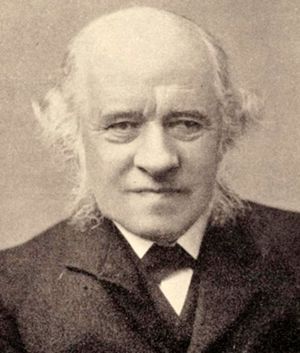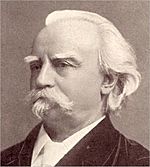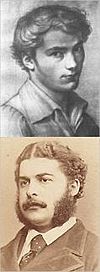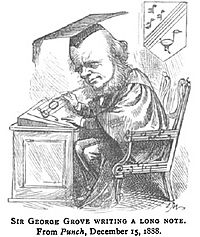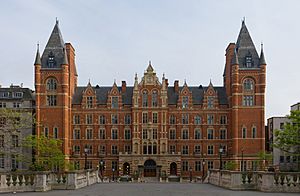George Grove facts for kids
Sir George Grove (born August 13, 1820 – died May 28, 1900) was an English engineer and writer. He is best known as the founder and editor of Grove's Dictionary of Music and Musicians.
Grove first trained as a civil engineer. He was very good at this job. However, his passion for music led him to work in the music world. He was in charge of concerts at the Crystal Palace. For these concerts, he wrote special notes about the music. These notes eventually led to his famous music dictionary.
He was very interested in the music of Franz Schubert. At that time, Schubert's music was not well known in England. Grove and his friend Arthur Sullivan traveled to Vienna in 1867. They were looking for Schubert's lost manuscripts. They found the missing music for Schubert's Rosamunde and several of his symphonies. This discovery helped people become interested in Schubert's work again.
Grove also became the first director of the Royal College of Music. He led the college from its start in 1883 until he retired in 1894. He hired important musicians like Hubert Parry and Charles Villiers Stanford to teach there. He also worked closely with the older music school in London, the Royal Academy of Music.
Besides his music work, Grove knew a lot about the Bible. He wrote for English literature on the subject. This included a concordance in 1854. He also wrote about a thousand pages for Sir William Smith's 1863 Bible Dictionary. He helped start the Palestine Exploration Fund.
Contents
His Life Story
His Early Life
George Grove was born in Clapham, London, in 1820. He was the eighth of eleven children. His father, Thomas Grove, sold fish and venison. His mother was Mary Blades. His younger sister, Eleanor Grove, later became a principal at College Hall, London.
He went to a prep school in Clapham. One of his school friends was George Granville Bradley. Bradley later became the Dean of Westminster Abbey. Grove later married Bradley's sister. Next, he went to Stockwell Grammar School. This school was run by Charles Pritchard, an astronomer. The school taught classics, religion, mathematics, and science. Pritchard also encouraged students to enjoy literature and music.
Grove regularly attended Holy Trinity Church in Clapham. There, he listened to music by Bach and Handel. By age sixteen, he was good at classics and math. He left school in 1836. He then became an apprentice to Alexander Gordon, a civil engineer in Westminster. In his free time, he studied music, going to concerts and reading scores.
In 1839, Grove finished his apprenticeship. He became a graduate of the Institution of Civil Engineers. A year later, he went to Glasgow to gain more experience. Between 1841 and 1846, Grove worked in the West Indies. He was an engineer building cast-iron lighthouses.
After this, he worked for the Chester and Holyhead Railway. Then, he became an assistant to Edwin Clark. He helped build the Britannia Bridge across the Menai Strait. His first published writing was about floating the bridge's tubes. This appeared in The Spectator in 1849. While working there, he lived in Chester. He heard music in the cathedral and learned Welsh folk songs.
Music and Bible Studies
While working on the Britannia Bridge, Grove met famous people. These included Robert Stephenson and Isambard Kingdom Brunel. They encouraged him to move to London. In 1849, he became the secretary of the Society of Arts. This was when the Great Exhibition of 1851 was being planned. Grove served as the society's secretary during the exhibition.
On December 23, 1851, he married Harriet Bradley. She was the sister of his old school friend, George Bradley. After the Great Exhibition closed in 1852, its main building was moved. It was rebuilt in Sydenham as the Crystal Palace. This new Crystal Palace became a center for education, arts, and fun. Grove was made its secretary.
He hired a band and a conductor, Heinrich Schallehn. Schallehn was not good, so August Manns replaced him. With Grove's help, Manns turned the band into a full symphony orchestra. Grove and Manns chose the music for the concerts. The Crystal Palace concerts became a very important part of London's music scene. They remained popular for many years.
Grove wrote the notes for the concert programs. These notes explained the music to the audience. He had never had formal music training. He learned everything by himself. He said he wrote about symphonies to understand them better. He wanted to share what he learned with other music lovers.
Grove's music notes did not use difficult technical words. He tried to make it clear what listeners should notice in each piece. For example, he wrote about Mozart's Symphony No. 39. He mentioned how Mozart worked very hard in 1788. Grove believed that great artists often face challenges. He thought these difficulties helped them become better.
Grove's notes at the Crystal Palace did not just focus on his favorite composers. He included many different musicians. These included French composers like Berlioz and Bizet. He also featured rising British composers. These were people like Arthur Sullivan, Hubert Parry, and Charles Villiers Stanford.
Grove wanted to make Schubert's music more popular. Schubert's music was mostly ignored in England. Grove and Manns presented the first performance in England of Schubert's Great C major Symphony. In 1867, Grove and his friend Arthur Sullivan went to Vienna. They were looking for Schubert's music papers. They found several of Schubert's symphonies and other pieces. They copied some of them.
They were very excited about their last discovery. Grove described finding a stack of music books. They were two feet high and covered in dust. These were all the music parts for Rosamunde. They had been tied up since 1823 and likely never touched. Schubert's nephew let them take and copy what they wanted.
In the early years at the Crystal Palace, Grove also studied the Bible. He noticed there was no full index of names in the Bible. So, Grove and his wife started making a complete list. They indexed every name in the Bible, including the Apocrypha. From 1860 to 1863, Grove was an assistant editor for Sir William Smith. He helped create a large Bible dictionary. Grove wrote over a thousand pages for it. Some of his entries, like the one on the prophet Elijah, were almost as long as a book.
He visited the Holy Land in 1859 and 1861. He also helped start the Palestine Exploration Fund. He became its honorary secretary and worked very hard for it. The Archbishop of York said Grove was "virtually the founder" of the society. Grove later said that people thought of him as a musician. But he felt he was just as interested in his Bible studies as in music.
Grove's Music Dictionary
After almost twenty years at the Crystal Palace, Grove left in 1873. He joined Macmillan and Co., a publishing company, as a director. He edited Macmillan's Magazine. He also wrote a geography book for Macmillan's "History Primers." But his most important work with Macmillan was A Dictionary of Music and Musicians. This is what he is most remembered for.
The idea for the dictionary was entirely his own. In 1874, he wrote that there was a need for English books about music. He felt there were no good books for regular readers about music history, theory, or musicians' lives.
Grove planned for two volumes, each about 600 pages. But when it was first published, it grew to four volumes. These contained a total of 3,125 pages. Macmillan released it in parts over 12 years, ending in 1889. Grove wrote very long articles on his favorite composers like Beethoven, Mendelssohn, and Schubert. The Musical Times newspaper praised his work. It said his biographies of these composers were excellent. It also noted that he traveled to Germany and Vienna to gather information for his articles.
Royal College of Music
In the 1880s, London's music schools were not doing well. The Royal Academy of Music was struggling. The National Training School for Music had money and management problems. There was a plan to combine them into one strong music school. But the Royal Academy wanted to stay independent. It later improved under Alexander Mackenzie.
The National Training School became the Royal College of Music in 1882. Grove was chosen as its first director. In 1882, he successfully raised money for the new college. This ensured its official opening by the Prince of Wales on May 7, 1883. Grove received a knighthood on the same day. He hired talented teachers like Parry and Stanford. These teachers helped the college become famous in the 20th century.
Grove focused the college on two main things: practical training and examinations. He wanted to improve orchestral playing. He aimed to replace old ways of learning music with better training. His second focus, examinations, followed a trend of forming professional groups. These groups regulated and standardized professions. An example was the Institution of Civil Engineers, which Grove joined in 1839.
When the college's rules were being written, Grove made sure it could award degrees. This was different from the Royal Academy. Mackenzie, worried the new college would be too powerful, suggested both schools award qualifications together. Grove agreed. He knew this would help stop the rivalry between the two schools.
The new Associated Board of the Royal Schools of Music was formed. It offered music qualifications to students from anywhere in the British Empire. Students had to meet high standards. In 1890, 1,141 students took the first exams. The exam fee was two guineas, which was a lot of money. The money helped both schools keep student fees low. This allowed the college to make a three-year course its basic standard.
Because of this good training, the college's students became known for their high-quality playing. Famous musicians like Joseph Joachim and Hans Richter performed with the college orchestra. Many praised it, including Bernard Shaw. Historian David Wright says that founding the Royal College of Music in 1883 was a major turning point for music training in Britain.
Retirement and Last Years
Grove retired in December 1894. Hubert Parry took over as director. By this time, a new building had been built for the college. In 1896, Grove's book Beethoven and his Nine Symphonies was published. It was written for music lovers in England.
In early 1899, Grove's health began to get worse. He died on May 28, 1900, at age 79. He passed away in the same house in Sydenham where he had lived for almost 40 years. He was buried in Ladywell and Brockley Cemetery.
See also
 In Spanish: George Grove para niños
In Spanish: George Grove para niños
 | James B. Knighten |
 | Azellia White |
 | Willa Brown |


